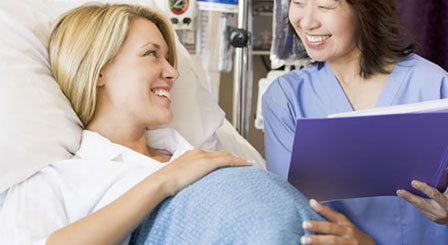Obstetrics & Gynecology

Your comfort and trust are as important to us as making sure you have access to a complete scope of
women's healthcare.
That's why our focus is always on working together with you to provide the best
obstetric and gynecological care for your unique individual needs.
What is a high-risk pregnancy?
Your pregnancy is called high-risk if you or your baby has an increased chance of a health problem. Many things can put you at high risk. Being called "high-risk" may sound scary. But it's just a way for doctors to make sure that you get special attention during your pregnancy. Your doctor will watch you closely during your pregnancy to find any problems early.
The conditions listed below put you and your baby at a higher risk for problems, such as slowed growth for the baby, preterm labor, preeclampsia, and problems with the placenta. But it's important to remember that being at high risk doesn't mean that you or your baby will have problems.

- Diabetes.
- Cancer.
- High blood pressure.
- Kidney disease.
- Epilepsy.





